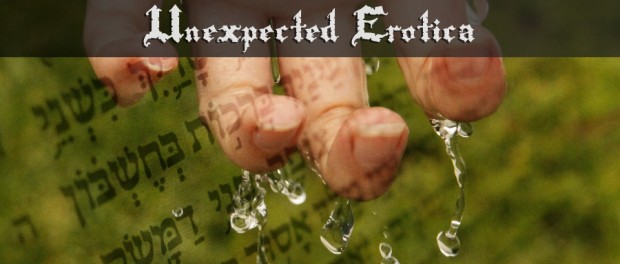Gathering Myrrh – Song of Songs 5:1

Song of Songs 5:1b
- KJV: I have gathered my myrrh with my spice;
- NIV: I have gathered my myrrh with my spice.
- NASB: I have gathered my myrrh along with my balsam.
The Hebrew word for gathering here is ‘ārâ, and it’s only used twice in the Old Testament. Psalm 80:12 (NASB) reads:
Why have you broken down its hedges,
So that all who pass that way may pick its fruit?
The word “pick” there is ‘ārâ as well, and it certainly paints a clear picture. It’s tied to picking fruit.
In fact, as Carr notes, “In rabbinic Hebrew, the term is used specifically of plucking figs, which in the ancient Near East had definite erotic and sexual links.”
I’d have to ignore repeated and obvious hints, I’d have to turn off my brain and pretend not to see a recurring motif, I’d have to basically lie to myself in order to perceive this sequence depicting anything but him pleasuring her with both penetration and oral sex.
Yet there is some uncertainty to the origin of the word ‘ārâ, and its rarity in Scripture doesn’t help. Some hold it to be related to ‘ûrîm, a word which is absent in the Bible but may have its root in words which are not absent, including ‘ôr (a verb meaning to give off light) or ‘arar (a verb meaning to curse), neither of which seems terribly fitting.
This lack of certainty leads some translators and commentators to dig deeper.
Pope offers “eat” as a suitable translation, which would certainly read rather erotically. Myrrh is not usually eaten, per se, but it may not need to be. We saw spices and myrrh referred to in combination a few verses earlier as a symbol of her genitalia. Here, as the consummation of their marriage ensues, it is no strange consideration for him to eat of her spices, either with the obvious — though argued by some as anachronistic — oral sex interpretation or with the idea of tasting or sampling her pleasures.
Here’s what I think:
- Given the upcoming references to myrrh surrounding his thrusting into her opening (5:4-5)…
- Given her commentary on his lips being like lilies dripping with myrrh (5:13)…
- Given her lover’s was mentioning a “mountain of myrrh” somewhere below her breasts (4:6)…
- Given the brazen use of aromatic spices in her “garden”, an obvious euphemism for her genitalia (4:13-14)…
- Given her immediately prior request for the wind to blow on the same “garden” so its fragrance would draw him to her, so he may eat its choice fruits (4:16)…
- And given the distinctive smell (not to be vulgar, but each woman does have her own smell)…
…I don’t feel like I have any rational choice.
Look, I get that many scholars dispute any oral sex interpretation here, but many scholars also dispute that the Song is sexual at all, which is hogwash in my opinion. For that matter, many scholars hold that oral sex is sinful, which it does not appear to be. I have to be intellectually honest with myself here, just as those same scholars must.
Reading this verse, I’d have to ignore repeated and obvious hints, I’d have to turn off my brain and pretend not to see a recurring motif, I’d have to basically lie to myself in order to perceive this sequence depicting anything but him pleasuring her with both penetration and oral sex.
And I say, “Good for him!” And her, hopefully; if not, give him time and feedback and it’ll get better.
No, myrrh wasn’t designed for eating, but don’t let that stop you. You might find you have a taste for it. If you like it, go for it, mister newlywed. She’s all yours now.
“Eat, friends, and drink; drink your fill of love.”
Originally posted 2016-08-12 08:00:54.


Leave a Reply